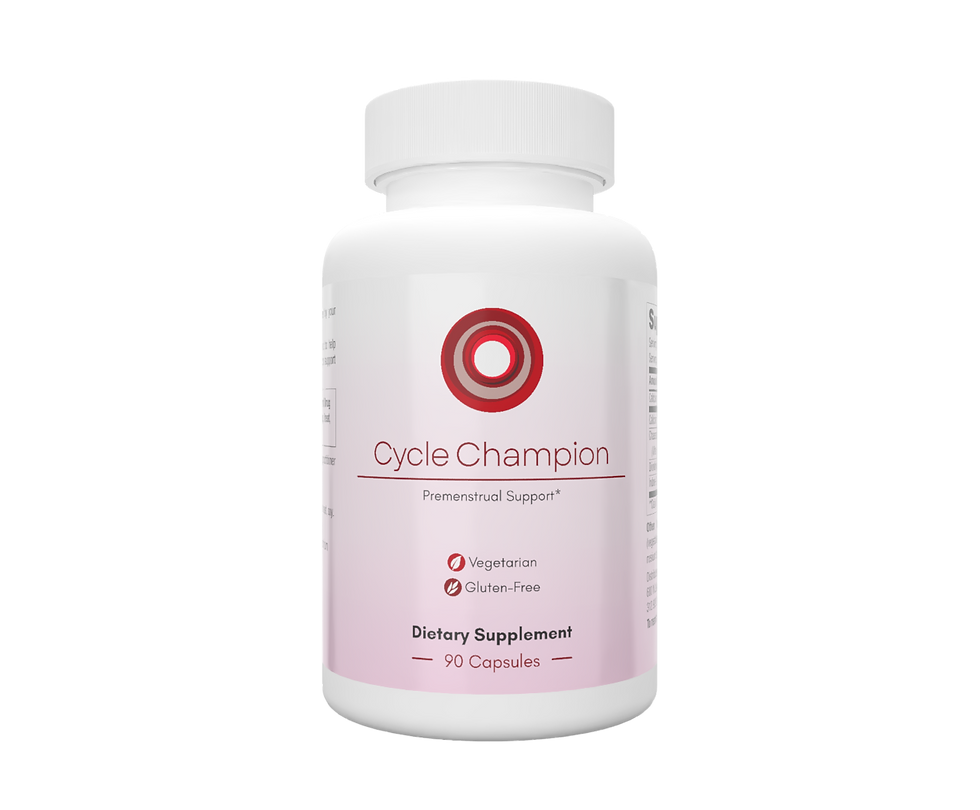Top 5 Dietary Tweaks to Balance Hormones
- Cindy Klinger, MS, RDN
- Nov 14, 2017
- 4 min read

Keeping your hormones happy goes way beyond crampy cycles and cranky moods. If the delicate balance of our hormones is disrupted, it can also affect sleep, energy and reproduction, as well as increase the risk of certain diseases. The ovaries produce several hormones, including estrogen, progesterone and testosterone. The brain also signals to the ovaries to release follicle stimulating hormone (FSH) and luteinizing hormone (LH). Imbalances of the interplay between these hormones can include endometriosis, menstrual irregularities, breast diseases and conditions, and PCOS, or Polycystic Ovarian Syndrome. Some symptoms of female hormonal imbalance might include:
Skin blemishes Bloating and swelling Lowered bone density Fertility problems Depression and anxiety Excessive facial and body hair growth Hot flashes Heavy bleeding/painful periods Irregular cycles Irritability and moodiness Decrease in muscle mass Hair loss Lowered libido Memory issues Night sweats Trouble concentrating Problems sleeping Tender or fibrocystic breasts Urinary incontinence Vaginal dryness Weight gain
The adrenal glands also produce steroid hormones, including cortisol, which controls the body’s ability to monitor and adapt to stress, along with supporting blood sugar maintenance and a healthy, functioning immune system. Most of the testosterone produced in the female body is produced in the adrenal glands. Adrenal imbalances can contribute to nervous and immune system dysfunction, difficulty regulating weight, blood sugar inconsistencies, and elevated androgen levels. If you suspect hormonal imbalances, please see a qualified practitioner to address them. You may need specific interventions, including medication or supplements, testing, etc. What’s exciting is that there are many natural ways to support your hormones.
Here are my top 5:
1. Try seed cycling: Incorporating certain seeds into your diet in a targeted way can help support the natural balance of your hormones. The premise is pretty simple: days 1-14 of your cycle is the estrogen-dominant phase. Including a TBSP each of raw, organic flax seeds and raw, organic pumpkin seeds every day during these two weeks is an easy way to help your hormones (estrogen and progesterone) work in sync. Flax seeds contain lignans, which block excess estrogen, and the zinc in pumpkin seeds help support progesterone production and release.
During the second two weeks of your cycle, the focus is on progesterone. In this phase, you’ll switch over to 1 TBSP each of raw, organic sesame and sunflower seeds. The sesame seeds are also high in lignans, helping to block excess estrogen, and sunflower seeds are rich in selenium, a trace mineral that supports the liver with its detoxification duties (one of those important jobs is to remove extra hormones from your body).
2. Eat more greens. Greens are the superstars of the nutrition world. They do it all: clean the liver, the blood, give you tons of minerals, vitamins and antioxidants, strengthen the immune system, reduce inflammation, and the list goes on. All of these functions serve to support your body’s natural ability to balance its hormones. Aim for ½ cup of greens per day and work your way up to 2 cups if you can. Think dark leafies like kale, spinach, bok choy, Swiss chard, lettuce, etc. Cruciferous vegetables also bind to estrogen and pull excess out of the body. (Note: if you have or suspect having any thyroid conditions, cook your cruciferous veggies and greens before eating).
3. Think 5 for fats. Omega-3 fats can help manage your mood, lower period pain (by improving blood flow and lowering inflammation in the reproductive organs) in addition to all their other benefits (like supporting brain function, lowering cholesterol and more). Aim to eat about 5 TBSP of healthy fats per day. This includes nuts and seeds, nut butters, oils like olive and coconut, avocados and fatty fish (like wild salmon and sardines). Include some sort of healthy fat at every meal.
4. Balance your blood sugar. Certain hormonal conditions, like PCOS, are closely linked to blood sugar levels. That’s the No. 1 thing I focus on with clients of mine who have this condition. But, blood sugar balance is super important for everyone. More and more research is coming out about how it’s tied in to energy, mood, cognitive function and the development of dementia, healthy or unhealthy aging, and more. Why is this?
Insulin is a hormone, so when it increases, so does cortisol, our stress hormone. Cortisol competes with progesterone for the same receptors, and usually wins out—which means progesterone is lowered, which means you’re in progesterone deficiency or estrogen dominance, setting the stage for things like PMS, PCOS, fibroids, heavy periods, mood issues, and more. There are also insulin receptors on our ovaries—who knew! This causes excess testosterone to be released, which can affect ovulation.
How to focus on our blood sugar? A few basic ways include eating protein at meals and snacks (think hard-boiled eggs, 3 ounces of turkey, a handful or nuts or peanut butter with your apple). Also, make sure you’re eating something at least every 4 hours, even if it’s something small. The highs and lows can cause these problems, so we want to make sure that blood sugar stays steady throughout the day.
5. Chew more, and more slowly. Practicing this technique will help you to not only recognize when you’re fuller more easily, but help your body be more efficient with digestion. That means more minerals and vitamins, which equals greater health for your body.
Being at a healthy weight also positively affects your hormones, and chewing more can help you eat up to a third less food! Ways to do that include checking in with a hunger scale like this (https://www.pritikin.com/your-health/healthy-living/eating-right/1838-hunger-scale-mindful-eating-weight-loss.html) before and during a meal, putting your fork down between bites, and even counting to 20 or 30 as you chew!
.
Have you tried any of these techniques and found they made a difference? Please let me know in the comments, or send me an email at gethealthy@cindyklinger.com.
Source: http://www.camdencountywoman.com, nicolejardim.com





Comments